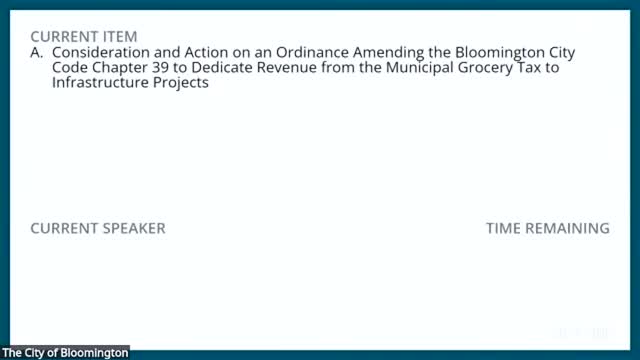Bloomington council votes to dedicate municipal grocery-tax revenue to infrastructure
Get AI-powered insights, summaries, and transcripts
Subscribe
Summary
The Bloomington City Council approved an ordinance dedicating estimated grocery-tax revenue to infrastructure and capital projects after a contentious debate on scope and fairness. The measure passed 5-4 after the mayor cast a tie-breaking vote; opponents called the move too broad and urged specificity and attention to the city's budget deficit.
The Bloomington City Council on Oct. 13 approved an ordinance amending the city code to dedicate revenue from the municipal grocery tax to infrastructure and capital projects, a measure the ordinance estimates will provide about $3 million a year.
Supporters framed the ordinance as a way to protect the tax receipts for roads, sidewalks, sewers, water and other capital projects. “Dedicating this revenue shows a clear commitment from all of us for infrastructure needs within the City of Bloomington,” Council member Strazza said when moving the measure.
Council member Motney, who seconded the measure and spoke at length, said Bloomington’s pavement condition is worsening and that dedicating the funds will help address an increasing backlog. “In the 2024 streets report, our PACER ratings showed that 40% of our streets were rated fair or below,” Motney said, adding that the 2025 presentation showed the number rising to about 50 percent and that the city is touching a road roughly every 50 years despite pavement life cycles being much shorter.
Opponents said the ordinance is too broad and risks diverting money away from the city’s stated budget priorities and from addressing a near-term deficit. “It feels like a slap in the face to those who can least afford it to have us go at the very next meeting, talking about all the things we're gonna spend this on,” Council member Ward said, referencing the grocery tax’s regressive effect.
Council member Scott, attending remotely, expressed concern about the ordinance’s general definition of “infrastructure” and urged clearer priorities and transparency on how the funds would be used.
The roll call on the motion resulted in a 4-4 tie; Mayor Dan Brady cast the deciding vote in favor. The mayor read the nays as Council members Kearns, Hendricks, Ward and Scott.
The ordinance does not appropriate funds to specific projects; the sponsor said individual projects funded by the dedicated revenue will return to the council for approval.
Why it matters: The grocery tax, approved at the previous meeting, drew criticism for its regressive impact. This ordinance directs the revenue explicitly toward capital and infrastructure, a move proponents say will assure taxpayers the money will be used for high-priority physical improvements. Opponents cautioned that a broad dedication without a specific project list could dilute impact and called for more budget detail.
The council approved the ordinance that dedicates the grocery-tax receipts to infrastructure; details on specific projects and budget timing were not specified in the ordinance and will be presented to the council in future budget or project approvals.
Votes and next steps: The ordinance passed after the mayor's tie-breaking vote. Council members and staff said they would follow up with supplemental materials on deferred maintenance and proposed priority lists for projects to be funded from the dedicated revenue.
